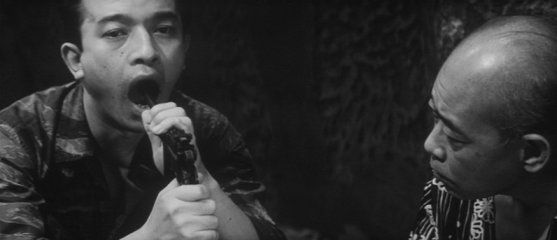When you hold a weapon, you understand the meaning of death for the first time.

By the time he made Japanese Summer: Double Suicide in 1967, Nagisa Oshima had just about lost interest in conventional plots and realistic characters. Instead, he throws the viewer headlong into a series of absurd set-pieces acted out by a collection of monomaniacal characters. For starters, there's the sexually adventurous 18-year-old girl (Keiko Sakurai) who wants to have sex with a man, any man. She latches onto a depressed deserter in fatigues (Kei Satô) who wants to be killed by someone, anyone, and he almost gets his wish when their beach rendezvous is interrupted by a gang looking for a cache of weapons in preparation for some big offensive. Instead, he finds himself pressed into service, deposited along with Sakurai in a waiting room of sorts with a group of hired killers.
Among them are a 17-year-old boy (Masakazu Tamura) who's itching to get his hands on a rifle, any rifle, an older man (Taiji Tonoyama) who knows that guns aren't toys, and an experienced assassin (Rokko Toura) who doesn't go anywhere without his portable television set. It's through this that we get periodic updates about a foreign-born rifleman (eventually revealed to be an American) who's causing havoc on the streets of Tokyo, turning it into "the Japanese Dallas" as the news coverage tactlessly puts it. Eventually the assembled killers head out to confront the sniper and take his side against the police, which is only natural considering their shared vocation. There are no easy outs for any of them, though, and the unnamed reporter covering the story sums it up perfectly when he asks, "What words could describe this crazy summer in Japan?" Clearly, there are none.